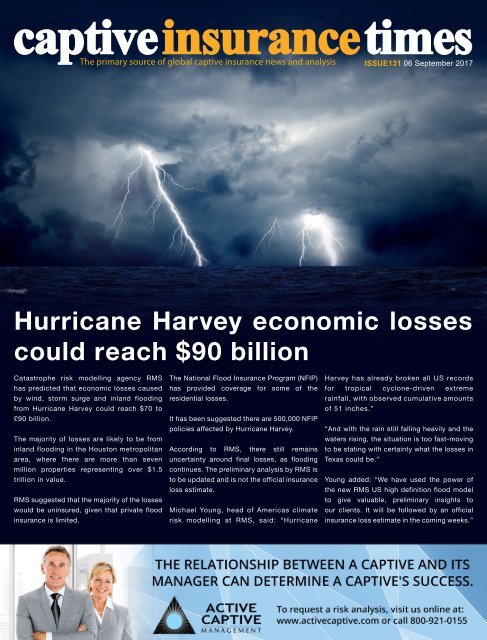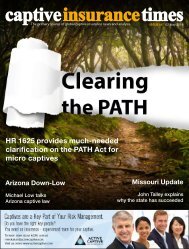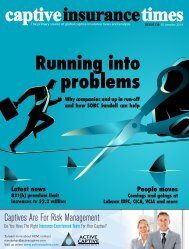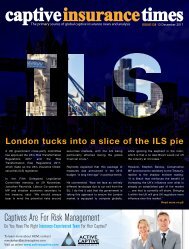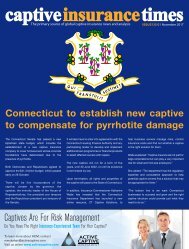Captive Insurance Times issue 131
In this issue of Captive Insurance Times, find out what happened at this year’s North Carolina Captive Insurance Association (NCCIA) Annual Conference, which attracted more than 200 delegates. In his opening speech, Tom Adams, president and CEO of the NCCIA, discussed the “vibrant, growing, ethical captive industry that is poised for growth”. Meanwhile, learn how experts in the captive insurance reacted to the US Tax Court’s ruling in favour of the IRS in the Avrahami case. Latest News: Catastrophe risk modelling agency RMS predicts Hurricane Harvey economic losses could reach $90 billion Avrahami Reaction: Unscrupulous micro captive managers and their motley crews might have walked their last plank following the ruling in the good ship Avrahami European Expansion: Brady Young, Stuart King and Andrew Berry tell Becky Butcher about the decision to expand into Europe with a new operation in Dublin Industry Appointments: Comings and goings at Marsh, Willis Towers Watson, Tenant Property Protection and more
In this issue of Captive Insurance Times, find out what happened at this year’s North Carolina Captive Insurance Association (NCCIA) Annual Conference, which attracted more than 200 delegates.
In his opening speech, Tom Adams, president and CEO of the NCCIA, discussed the “vibrant, growing, ethical captive industry that is poised for growth”.
Meanwhile, learn how experts in the captive insurance reacted to the US Tax Court’s ruling in favour of the IRS in the Avrahami case. Latest News: Catastrophe risk modelling agency RMS predicts Hurricane Harvey economic losses could reach $90 billion
Avrahami Reaction: Unscrupulous micro captive managers and their motley crews might have walked their last plank following the ruling in the good ship Avrahami
European Expansion: Brady Young, Stuart King and Andrew Berry tell Becky Butcher about the decision to expand into Europe with a new operation in Dublin
Industry Appointments: Comings and goings at Marsh, Willis Towers Watson, Tenant Property Protection and more
You also want an ePaper? Increase the reach of your titles
YUMPU automatically turns print PDFs into web optimized ePapers that Google loves.
ISSUE<strong>131</strong> 06 September 2017<br />
Hurricane Harvey economic losses<br />
could reach $90 billion<br />
Catastrophe risk modelling agency RMS<br />
has predicted that economic losses caused<br />
by wind, storm surge and inland flooding<br />
from Hurricane Harvey could reach $70 to<br />
£90 billion.<br />
The majority of losses are likely to be from<br />
inland flooding in the Houston metropolitan<br />
area, where there are more than seven<br />
million properties representing over $1.5<br />
trillion in value.<br />
RMS suggested that the majority of the losses<br />
would be uninsured, given that private flood<br />
insurance is limited.<br />
The National Flood <strong>Insurance</strong> Program (NFIP)<br />
has provided coverage for some of the<br />
residential losses.<br />
It has been suggested there are 500,000 NFIP<br />
policies affected by Hurricane Harvey.<br />
According to RMS, there still remains<br />
uncertainty around final losses, as flooding<br />
continues. The preliminary analysis by RMS is<br />
to be updated and is not the official insurance<br />
loss estimate.<br />
Michael Young, head of Americas climate<br />
risk modelling at RMS, said: “Hurricane<br />
Harvey has already broken all US records<br />
for tropical cyclone-driven extreme<br />
rainfall, with observed cumulative amounts<br />
of 51 inches.”<br />
“And with the rain still falling heavily and the<br />
waters rising, the situation is too fast-moving<br />
to be stating with certainty what the losses in<br />
Texas could be.”<br />
Young added: “We have used the power of<br />
the new RMS US high definition flood model<br />
to give valuable, preliminary insights to<br />
our clients. It will be followed by an official<br />
insurance loss estimate in the coming weeks.”
News Round-Up<br />
NY Tax Tribunal disallows Stewart’s<br />
Shops payments to captive insurer<br />
Payments that Stewart’s Shops made to<br />
its captive insurance subsidiary Black<br />
Ridge <strong>Insurance</strong> Corporation (BRIC) “were<br />
not deductible premiums for determining<br />
federal taxable income”, according to the<br />
New York Tax Appeals Tribunal.<br />
Inside<br />
Stewart’s Shops, the owner and operator of<br />
300 convenience stores and gas stations in<br />
New York and Vermont, lost its appeal in July<br />
against previous determinations holding<br />
that since there was neither risk shifting nor<br />
distribution of risk, the payments could not<br />
be considered deductible premiums.<br />
The pure captive was formed in 2003 under<br />
New York’s captive legislation, which was<br />
introduced in 1997. Under those statutes,<br />
captive insurance companies would be<br />
subject to gross premium taxes.<br />
In 2010 and 2011, the New York Division of<br />
Taxation conducted an audit of Stewart’s<br />
Shops and concluded that the payments from<br />
Stewart’s Shops to BRIC were “not allowable”.<br />
Conference Report<br />
Delegates gathered in North Carolina to<br />
attend the state’s annual conference<br />
page 8<br />
European Expansion<br />
After 15 years of success with its North<br />
American captive business, SRS has<br />
expanded into Europe with a new operation<br />
page 16<br />
Avrahami Reaction<br />
<strong>Captive</strong> insurance industry experts discuss<br />
the recent Avrahami ruling<br />
page 12<br />
Industry Appointments<br />
Comings and goings at Marsh, Willis<br />
Towers Watson and Tenant Property<br />
Protection and more<br />
page 19<br />
The division asserted that the payments<br />
were not deductible premiums for<br />
determining federal taxable income<br />
because “there was neither risk shifting nor<br />
distribution of risk, the payments could not<br />
be considered deductible premiums”.<br />
The New York Tax Appeals Tribunal agreed<br />
with an administrative law judge who<br />
determined that the deduction should be<br />
disallowed despite the recognition of BRIC<br />
as an insurance company for the purposes<br />
of New York insurance law.<br />
Commenting on the decision, specialist<br />
tax agency Ryan said: “It would appear<br />
that Stewart’s Shops did everything right<br />
in establishing BRIC, and that BRIC was<br />
an insurance company under New York<br />
insurance law.”<br />
“But for tax purposes, not only does an<br />
insurance company need to meet the<br />
requirements of state insurance laws, it must<br />
also be considered an insurance company<br />
for federal income tax purposes, if the state<br />
uses federal tax income as the starting point<br />
for determining state income tax.”<br />
“If it had included enough additional<br />
parties and their related risks in BRIC, the<br />
MANAGING RISK WORLDWIDE<br />
DELIVERING SOLUTIONS FOR BUSINESSES AND INSURERS WORLDWIDE<br />
To find out more, please contact :<br />
Life Company Management<br />
Jeffrey More<br />
+44 1624 683602<br />
Jeffrey.More@ctplc.com<br />
<strong>Captive</strong> Management<br />
William Wood<br />
+1 441 278 7709<br />
William.Wood@ctplc.com<br />
Risk Management<br />
Chris Moss<br />
+1 972 447 2053<br />
Christopher.Moss@ctplc.com<br />
www.ctplc.com<br />
2 <strong>Captive</strong> <strong>Insurance</strong> <strong>Times</strong> www.captiveinsurancetimes.com
News Round-Up<br />
diversification of risk requirements would<br />
have been satisfied, and the deductions<br />
would have been allowed.”<br />
Hawaii approves agency captive<br />
Atlas <strong>Insurance</strong> Agency’s new whollyowned<br />
captive has received licensing<br />
approval from the insurance division of<br />
the Hawaii Department of Commerce and<br />
Commerce Affairs.<br />
Working with Elevate <strong>Captive</strong>s, Atlas<br />
<strong>Insurance</strong> Agency has created Atlas<br />
Elite Risk Management Group <strong>Insurance</strong><br />
Company, domiciled in Hawaii.<br />
Myles Murakami, president of Atlas <strong>Insurance</strong><br />
Agency, said: “This captive can now become<br />
another tool for our clients and interested<br />
Hawaii companies to use as part of a broader<br />
strategy to manage and finance their risk.”<br />
“Companies who use a captive will have<br />
access to important information and data<br />
about their risks and components of their<br />
premium and will have an opportunity<br />
to play a role in its pricing and delivery,”<br />
Murakami explained.<br />
Jerry Messick, CEO of Elevate <strong>Captive</strong>s,<br />
added: “As more and more companies are<br />
exploring methods to maintain and contain<br />
costs, captives provide a customisable riskfinancing<br />
platform that can be designed to<br />
meet each company’s needs.”<br />
“With Atlas Elite Risk Management Group<br />
<strong>Insurance</strong> Company, Atlas <strong>Insurance</strong> Agency<br />
is expanding its services to its clients and<br />
reaffirming its position and standing as<br />
Hawaii’s largest insurance agency.”<br />
Russell Group releases new analytical<br />
modelling service<br />
Russell Group has launched ALPS Casualty<br />
to support the analytical modelling of<br />
liability exposures stemming from the<br />
corporate industry.<br />
The group, partnering with Dun &<br />
Bradstreet, created a service that matches<br />
and references each portfolio’s insureds.<br />
The service links any subsidiary<br />
insured companies to the ultimate<br />
parent company, while also identifying<br />
geographies and industry sectors that<br />
the insured operates within.<br />
ALPS Casualty enables casualty<br />
underwriters to understand their exposure,<br />
capital utilisation and underlying risk prior<br />
to capital commitment.<br />
Benefits to underwriters include better risk<br />
selection, optimised capital and improved<br />
response to market opportunities for new<br />
risk products.<br />
Commenting on the launch, Suki Basi, CEO<br />
of Russell Group, said: “ALPS Casualty<br />
is the first of a new generation of ALPS<br />
products that will help underwriters to<br />
model, price and manage connected risk.”<br />
Excellence in <strong>Insurance</strong> Asset Management<br />
Enterprise Risk Management<br />
focused solutions<br />
Fixed income, equity and<br />
alternatives expertise<br />
Direct interface with portfolio<br />
managers<br />
Regulatory and A.M. Best reporting<br />
and support<br />
24/7 online investment and<br />
statutory accounting<br />
Comprehensive<br />
investment<br />
solutions<br />
customized to<br />
fit your needs.<br />
800-767-8020 | 480-596-3338<br />
info@madisonascottsdale.com | madisonscottsdale.com<br />
Madison Scottsdale is the insurance asset management division of Madison Investment Advisors, LLC.<br />
www.captiveinsurancetimes.com<br />
<strong>Captive</strong> <strong>Insurance</strong> <strong>Times</strong><br />
3
News Round-Up<br />
EPM captive rated excellent<br />
A.M. Best has affirmed the financial strength<br />
rating of “A- (Excellent)” and long-term<br />
<strong>issue</strong>r credit rating of “a-” of Maxserguros,<br />
the single-parent captive insurer of<br />
Empresas Publicas de Medellin (EPM).<br />
The ratings reflect Maxseguros’s strong<br />
risk-adjusted capitalisation, supported by<br />
a comprehensive and adequate reinsurance<br />
programme, a history of consistently<br />
strong operating performance, sound risk<br />
management capabilities and conservative<br />
balance sheet strategies.<br />
According to A.M. Best, the positive<br />
ratings are partially offset by<br />
Maxseguros’s limited business and<br />
market scope, which is somewhat<br />
mitigated by the company’s stable loss<br />
history, favourable geographic spread<br />
of risk and the history of Maxseguros’s<br />
growing surplus position and the support<br />
of its ultimate parent, EPM.<br />
The captive provides reinsurance to the<br />
EPM group, covering property damage and<br />
business interruption, commercial crime<br />
and directors’, officers’ and construction<br />
liability exposures.<br />
EPM, owned by the Colombian municipality<br />
of Medellin, is a power generation and<br />
multi-utility company in Columbia.<br />
A.M. Best suggested that Maxseguros<br />
is well-positioned to sustain a strong<br />
level of operating performance due to its<br />
demonstrated risk management expertise<br />
and conservative underwriting criteria,<br />
hence, the stable outlooks.<br />
CapAlt to provide captive services to<br />
Financial Engineering Institute<br />
The Financial Engineering Institute’s (FEI)<br />
network has selected <strong>Captive</strong> Alternatives<br />
to provide captive insurance company<br />
management services. <strong>Captive</strong> Alternatives<br />
will provide services to the FEI’s network<br />
of wealth management firms, investment<br />
and insurance advisers, and attorneys and<br />
certified public accountants.<br />
Nick Gregory, president and managing<br />
partner of FEI, commented: “The captive<br />
insurance model is an essential consideration<br />
when it comes to building a comprehensive<br />
risk and wealth management strategy.<br />
<strong>Captive</strong> Alternative’s international presence<br />
and expertise in this market make them a<br />
natural fit for our team.”<br />
<strong>Captive</strong> Alternatives CEO Mark Jacobs<br />
added: “To achieve the wealth management<br />
goals of a family or business and remain<br />
fully compliant, you have to assemble a<br />
great team. We are honoured to join one in<br />
FEI’s expert sourcing team.”<br />
A.M. Best affirms UnipolRe ratings<br />
A.M. Best has affirmed the financial strength<br />
rating of “A- (Excellent)” and the long-term<br />
<strong>issue</strong>r credit rating of “a-” of UnipolRe<br />
4 <strong>Captive</strong> <strong>Insurance</strong> <strong>Times</strong> www.captiveinsurancetimes.com
News Round-Up<br />
Designated Activity Company (UnipolRe),<br />
based in Ireland.<br />
According to A.M. Best, the ratings reflect<br />
UnipolRe’s excellent risk-adjusted capitalisation<br />
and good operating performance.<br />
In addition, the ratings consider<br />
UnipolRe’s strategic importance to its<br />
parent UnipolSai Assicurazioni.<br />
Unipol Re operates as a European thirdparty<br />
reinsurer, which operated as a group<br />
reinsurance captive until the end of 2014.<br />
A.M. Best expects the company’s riskadjusted<br />
capitalisation to remain at an<br />
excellent level over the medium term, with<br />
additional capital contributions from its<br />
parent supporting expansion in line with the<br />
company’s updated business strategy.<br />
The company reported gross written<br />
premiums of €56.5 million in 2016 and<br />
is expected to increase significantly its<br />
business volumes in 2017. An offsetting<br />
rating factor is the risk inherent in rapid<br />
premium growth predominantly in one line<br />
of business.<br />
RMC opens London offices<br />
The RMC Group has opened two new<br />
offices in the UK, in a move that it has called<br />
a “strong statement” of intent to build on its<br />
international presence.<br />
Ryan Mitchell, president of European<br />
operations at RMC, will work in the London<br />
offices and is responsible for coordinating<br />
the group’s European reinsurance business.<br />
Mitchell said: “Opening several offices in<br />
London is a strong statement of our intent<br />
to expand RMC’s international presence<br />
and growth.”<br />
“We have bold ambitions to grow our<br />
European platform, and anticipate adding<br />
both personnel and product lines in the<br />
near future.”<br />
One of the new offices is located in central<br />
London, close to Liverpool Street Station, and<br />
the other is on Brewhouse Lane in East London.<br />
R&Q sees positive growth in first half of 2017<br />
Randall & Quilter (R&Q) Investment Holdings<br />
has reported “positive movements” in the<br />
£5.9 million, compared to £1.2 million and<br />
£900,000 respectively in the previous year.<br />
group’s existing run-off portfolios, with a<br />
reserve release of £5 million.<br />
Commenting on the results, Randall said:<br />
“I am pleased to report that the group<br />
According to the insurance investor, delivered a very strong performance during<br />
the favourable results were aided by the first half of the year.”<br />
commutation activity in the US and<br />
favourable development in certain “It is the board’s view, especially given<br />
captive accounts.<br />
the advanced state of a number of other<br />
legacy transactions and the growing<br />
Chairman and CEO of R&Q Ken Randall,<br />
suggested that legacy acquisition activity<br />
pipeline, that the results for the full year<br />
will be at least in line with expectations,<br />
was the key driver, while existing books absent unforeseen circumstances.”<br />
continued to run-off favourably.<br />
He added: “Our planned focus on legacy<br />
Randall also attributed growth to the<br />
growing scale of Syndicate 1991, together<br />
with some favourable claims movements,<br />
acquisitions and the use of Accredited<br />
and R&Q <strong>Insurance</strong> Malta as conduits for<br />
niche programme business to highly rated<br />
resulting in an improved result from the reinsurers looks increasingly well placed.”<br />
company’s live syndicate participations, as<br />
well as certain one-off items in the captive<br />
management segment.<br />
“There are good growth opportunities in<br />
both of these core operations and the<br />
Group’s strong and growing market position<br />
Overall, R&Q generated a pre-tax profit<br />
of £5.4 million and a post-tax profit of<br />
is being driven by our central tenets of<br />
expertise and innovation.”<br />
www.captiveinsurancetimes.com<br />
<strong>Captive</strong> <strong>Insurance</strong> <strong>Times</strong><br />
5
News Round-Up<br />
Sixth acquisition for Compre<br />
Compre, the insurance and reinsurance<br />
legacy specialist, has provided a legacy<br />
solution to a portfolio of AXA <strong>Insurance</strong>.<br />
The portfolio of insurance and reinsurance<br />
business in run-off was underwritten by<br />
RW Gibbon, an underwriting agency, and<br />
RW Gibbon & Son, the Gibbon pools,<br />
between 1962 and 1964.<br />
Compre has provided ACA with finality<br />
regarding its participation in the Gibbon<br />
pools for an undisclosed sum.<br />
Nick Steer, CEO of Compre, said: “I am<br />
extremely pleased to announce our sixth<br />
acquisition this year and our third involving<br />
the Gibbon pools.”<br />
“This follows a similar deal with Swiss<br />
Re International SE in January and fulfils<br />
our ambition of completing another poolarrangement<br />
transaction this year.”<br />
He added: “It underlines the demand<br />
for run-off solutions, and our expertise<br />
in providing finality for complex pool<br />
arrangements, and further highlights our<br />
excellent reputation among large European<br />
insurance groups.”<br />
Customer service is key to captive<br />
insurer redomestications<br />
Customer service is key to attracting<br />
potential captive insurers to a particular<br />
jurisdiction, according to Leanne Refalko,<br />
senior captive insurance specialist at the<br />
North Carolina Department of <strong>Insurance</strong>.<br />
Refalko, speaking at the North Carolina<br />
<strong>Captive</strong> <strong>Insurance</strong> Association Annual<br />
Conference in Charlotte, said the state<br />
department prides itself on giving great<br />
customer service that yields a high rate<br />
of redomestications.<br />
“That is how we differentiate ourselves<br />
from other domiciles,” she explained.<br />
“We had 25 redomestications in 2016 and<br />
it is essential for us to talk with captive<br />
managers and respond to them quickly.”<br />
“We just understand how important it is<br />
to provide that customer service to our<br />
captive managers.”<br />
Patrick Theriault, managing director at<br />
Strategic Risk Solutions, identified selfprocurement<br />
tax as one reason why<br />
captives might look to leave a jurisdiction<br />
in the first place.<br />
Self-procurement tax is imposed on<br />
insurance purchased from insurers that<br />
are not authorised to do business in the<br />
particular state, which in many cases<br />
applies to captives.<br />
Theriault said: “It is important to remember<br />
the tax applies to the insured, it is not a<br />
captive tax, meaning that a captive is<br />
never subject to self-procurement, it’s the<br />
insurance buyer.”<br />
6 <strong>Captive</strong> <strong>Insurance</strong> <strong>Times</strong> www.captiveinsurancetimes.com
Protect Your Back<br />
and Your Bottom Line.<br />
Smart businesses<br />
know how to<br />
manage risk,<br />
expenses and cash<br />
flow by covering<br />
themselves with<br />
captive insurance.<br />
As the leading bank for business,* and one of the few banks with a dedicated captive<br />
team, Comerica Bank can help find the best financial solutions for your captive.<br />
Our award-winning captive insurance team has been serving the needs of captives<br />
for over 25 years in all major domiciles. We provide the banking tools and services<br />
required to effectively manage captives, from letters of credit to Regulation 114 Trusts<br />
and investment management. 1<br />
To learn more, call 313.757.5046 or visit Comerica.com/captive.<br />
RAISE YOUR EXPECTATIONS.<br />
®<br />
MEMBER FDIC. EQUAL OPPORTUNITY LENDER.<br />
*Comerica ranks first nationally among the top 25 U.S. financial holding companies, based on commercial and industrial loans outstanding as a percentage of assets, as of December 31, 2016. Data provided<br />
by SNL Financial. 1 Securities and other non-deposit investment products are not insured by the FDIC; are not deposits or other obligations of, or guaranteed by, Comerica Bank or any of its affiliates; and<br />
are subject to investment risks, including possible loss of the principal invested. Past performance is not indicative of future results.<br />
CBC-7079-03 06/17
Conference Report<br />
Teamwork makes the dream work<br />
More than 200 delegates gathered in Charlotte, North Carolina, to<br />
attend the state’s three-day annual captive insurance conference.<br />
Becky Butcher reports<br />
Tom Adams, president and CEO of the North Carolina <strong>Captive</strong><br />
<strong>Insurance</strong> Association (NCCIA), opened the Annual Conference by<br />
thanking those in the industry who have helped make the state’s<br />
captive market the success it is today.<br />
In 2013, North Carolina created a statutory framework that set an<br />
“appropriate regulatory standard that has become the cutting edge<br />
for captive regulation, and assures that captives in North Carolina<br />
are doing business the right way”, Adams said.<br />
In his opening speech on 21 August, Adams explained that as a result<br />
of the industry’s hard work, the state now has a “vibrant, growing,<br />
ethical captive industry that is poised for growth in this domicile”. He<br />
gave a special mention to former insurance commissioner Wayne<br />
Goodwin and former senior deputy commissioner Ray Martinez for<br />
their hard work to make captive insurance in the state a reality.<br />
The state went “a step further” when a committee chaired by<br />
Jonathan Reich developed a voluntary code of ethics for those<br />
captives and their service providers that do business in the state.<br />
Adams suggested that the code of ethics “moves North Carolina a<br />
step ahead of other domiciles”.<br />
The duo were presented with individual awards for their hard work<br />
by Adams and chair of the NCCIA, Jeremy Colombik, who added<br />
that the NCCIA and state insurance department’s “hand in glove<br />
approach” has been a key factor to the state’s success as a captive<br />
insurance domicile.<br />
Adams went on to discuss how North Carolina crafted its captive<br />
laws. He said: “We have had a tendency in this country to over<br />
regulate the industry, to the detriment of our people.”<br />
He called for other domiciles to follow the state’s lead and establish<br />
their own codes of ethics, even offering to make North Carolina’s<br />
available as an example for others to adopt.<br />
Adams concluded: “The important thing is this industry should live<br />
up to its values and responsibilities to the public and that goes<br />
beyond simply satisfying the regulations.”<br />
Form an orderly queue<br />
“I believe that for the more recent captive domiciles we have been<br />
able to craft legislation, establishing and promulgating the best<br />
regulatory practices to create appropriate frameworks for regulation<br />
rather than simply making an industry jump through hoops to make<br />
the regulator look ‘strong’.”<br />
North Carolina learned from the experiences of Tennessee, South<br />
Carolina, Delaware and others when drafting its captive statue.<br />
This work has yielded significant growth in formations, according<br />
to Debbie Walker, deputy commissioner of the North Carolina<br />
Department of <strong>Insurance</strong>.<br />
Walker said that in 2016, North Carolina licensed 85 captive insurance<br />
companies and approved 132 protected cells or series The state<br />
currently has 187 active licensed captive insurance companies and<br />
348 cells.<br />
8 <strong>Captive</strong> <strong>Insurance</strong> <strong>Times</strong> www.captiveinsurancetimes.com
Conference Report<br />
A number of captives have also redomesticated to the state<br />
since its programme’s inception.<br />
That figure stands at 53, including 25 in 2016 alone. Of those<br />
redomestications, 21 percent came from onshore locations<br />
such as Alabama, Hawaii, Delaware, South Carolina, Utah and<br />
Vermont, while 79 percent came from offshore domiciles including<br />
the British Virgin Islands, Anguilla, Nevis, St Kitts and St Lucia.<br />
Walker said: “One of the reasons for the redomestications was<br />
captive managers, which already have business in the state,<br />
bringing other companies they work with back onshore.”<br />
All of this captive business is having a significant economic impact<br />
in North Carolina. Between 2014 and 2016, the state recorded an<br />
economic impact of $41 million from the captive insurance industry,<br />
creating more than 60 jobs.<br />
The economic impact figure is made up of premium tax, service<br />
provider and hospitality revenues.<br />
State tax levies were the subject of an NCCIA governmental affairs<br />
committee during the conference.<br />
The association is working with the insurance department to<br />
determine if it is reasonable and appropriate to make changes to<br />
the North Carolina statutes that govern the calculation of premium<br />
taxes due by protected cell and special purpose series captives<br />
licensed and domiciled in the state.<br />
A technical corrections bill containing other multiple non-captive<br />
insurer related changes to the state’s revenue laws became the<br />
vehicle for this undertaking earlier this year.<br />
Senate Bill 628 was amended to rewrite and clarify the language<br />
contained in NCGS 105-228.4A regarding the premium taxes for<br />
protected cell and special purpose series captive insurers.<br />
But during the legislative session on 30 June, the Senate declined to<br />
concur on the changes put forward by the House of Representatives,<br />
which meant the bill had to go to the conference committee.<br />
When the Senate reconvened, the premium tax calculation changes, as<br />
well as dollar cap language contained in the prior House amendments,<br />
were deleted. The amendment was not included in the final bill as<br />
adopted. As a result, no change was made to North Carolina’s captive<br />
insurer premium tax law during the 2017 legislative session.<br />
The NCCIA government affairs committee said during its meeting at<br />
the conference that it and the insurance department plan to revisit<br />
the legislation in the coming months to improve on the previous<br />
amendments ahead of the next session, which begins in May next year.<br />
Matt Mascia, captive insurance manager at the North Carolina<br />
Department of <strong>Insurance</strong>, emphasised that the state’s captive<br />
www.captiveinsurancetimes.com<br />
<strong>Captive</strong> <strong>Insurance</strong> <strong>Times</strong><br />
9
Conference Report<br />
programme has been a “tremendous windfall” from an economic<br />
standpoint. He said: “It just keeps getting better and better and we<br />
need to get that message across [to legislators].”<br />
Determined for the state to continue its success, Alex Webb, senior<br />
partner at Webb & Coyle, believes it’s time for the state to “ramp it<br />
up again and continue to climb the mountain”.<br />
According to Richard Lane Brown, vice president of government<br />
affairs at the NCCIA: “If you add [it all] up … you approach a billion<br />
dollars for the state, annually. We’re approaching that annually.”<br />
He added: “I think it’s easier now [to convince others of North<br />
Carolina’s captive proposition], with social media, there’s more<br />
information, more states making more laws. People are realising it<br />
doesn’t matter how big or small the states are, but it matters about<br />
how good the solution is.”<br />
Taxing times<br />
Attendees of the meeting also discussed the Internal Revenue<br />
Service’s (IRS) scrutiny of 831(b) captives and the release of<br />
Notice 2016-66.<br />
Webb suggested that the notice has kept the industry in<br />
“some degree of angst” since November when the notice was<br />
first published.<br />
The NCCIA is continuing to “push back” on IRS implementation<br />
of its burdensome Notice 2016-66. To date, efforts to secure<br />
rescission of the notice have focused on several fronts. Brown<br />
explained that the best opportunity might occur during the<br />
forthcoming tax reform debate.<br />
Brown said: “The North Carolina Department of <strong>Insurance</strong> has been<br />
discussing the efforts they are going to undertake to, on the one hand,<br />
protect 831(b) captives, but on the other hand, to seek congressional<br />
rescission to protect 831(b) and seek rescission of it itself.”<br />
“They are two big <strong>issue</strong>s, but the greater <strong>issue</strong> is of course<br />
preserving the 831(b) exclusion, which could have a real impact on<br />
North Carolina, Congress and a whole bunch of other states.”<br />
Of course, just hours after the meeting on 21 August, a ruling in<br />
Avrahami v IRS court case was <strong>issue</strong>d, meaning that tax became<br />
the main topic of conversation at that evening’s drinks reception.<br />
On the last day of the conference, tax experts Bruce Wright of<br />
Eversheds Sutherland and Tom Jones of McDermott, Will & Emery<br />
addressed the Avrahami decision.<br />
Jones described the decision as “bitter-sweet”. He said: “People<br />
haven’t sliced and diced the case yet, it’s really a mixed bag. It’s not<br />
just a win for the IRS, depending on what perspective you have, it’s<br />
a bitter-sweet decision.”<br />
Jones argued that the decision “reaffirms risk exposure units and<br />
most of the bigger captives generally don’t suffer a lot of the <strong>issue</strong>s<br />
that existed with this tax case”.<br />
He suggested that small captives have to be put into two categories:<br />
the good and the bad. “We know what’s bad but we don’t know<br />
where the line is drawn between the good and the bad, and that’s<br />
the <strong>issue</strong>,” Jones explained.<br />
Wright also weighed in and suggested that the industry should learn<br />
from this case.<br />
In prior years, major tax law changes have often been the vehicle<br />
for delaying, modifying or rescinding IRS regulatory actions that<br />
US Congress believes contravene the Internal Revenue Code,<br />
exceed Congressional intent, or just represent misdirected policy<br />
choices, according to Brown.<br />
The NCCIA initially supported a delay in the effective date for<br />
the notice, and the US Treasury bowed to wishes of the captive<br />
insurance industry.<br />
According to Wright, when drafting policies, they should be done so<br />
in a “feasible, clear, concise and realistic way”.<br />
Wright explained: “If you are going to write those risks you<br />
should have good actuarial back up, which is plausible and the<br />
court is going to accept for the premium that is being charged<br />
for that particular risk, and the actuarial report should also<br />
indicate a reasonable amount of capital to be able to support<br />
that particular line of business.” CIT<br />
www.captiveinsurancetimes.com<br />
<strong>Captive</strong> <strong>Insurance</strong> <strong>Times</strong><br />
10
North Carolina has a state-of-the-art law that provides for<br />
a low cost of formation and operation for captive insurance<br />
companies, a commitment to sensible pro-business captive insurer<br />
regulation, and a dedicated, knowledgeable and experienced team of<br />
professionals who provide prudent regulation and outstanding customer service.<br />
Visit www.nccaptives.com to learn more and discover why North Carolina is the best domicile<br />
choice for your captive insurance company. For more information, contact Debbie Walker at<br />
919-807-6165 or debbie.walker@ncdoi.gov.
Avrahami Reaction<br />
They’re more like guidelines anyway<br />
Unscrupulous micro captive managers and their motley crews might have<br />
walked their last plank following the ruling in the good ship Avrahami<br />
Few disputes will garner the kind of attention that Avrahami v the<br />
Internal Revenue Service (IRS) has over the past few weeks. Put<br />
forward as a potential Holy Grail that will allow small captives<br />
to forever endure, the US Tax Court’s ruling in favour of the<br />
IRS has somewhat soured the industry’s mood, although, as it<br />
will become clear, a healthy dose of realism might have been<br />
necessary, anyway.<br />
In reaction to the Tax Court’s 21 August decision to block Benyamin<br />
and Orna Avrahami’s captive, Feedback, from electing 831(b)<br />
of the Internal Revenue Code for certain financial years, Jeffrey<br />
Simpson, director at the Delaware law firm of Gordon, Fournaris<br />
& Mammarella, suggested that although the captive insurance<br />
industry did not get the win it was hoping for, “this is an important<br />
first step toward the industry’s getting the guidance it needs to<br />
move forward constructively”.<br />
Simpson said: “It doesn’t address all of the pieces of the puzzle,<br />
and I don’t think anyone imagined it would, but it does give us<br />
something concrete to work with.”<br />
The Avrahamis argued that their captive, Feedback, is a<br />
valid insurance company that qualified to be elected under<br />
Section 831(b), all of its policies covered insurable risks,<br />
and premiums were actuarially determined, and the captive<br />
distributed risk.<br />
Feedback’s risk exposures fell short of meeting the threshold for<br />
insurable risk, according to Judge Mark Holmes. He ruled: “While<br />
we recognise that Feedback is a micro captive and must operate<br />
on a smaller scale than [other insurance companies the Tax Court<br />
has examined], we can’t find that it covered a sufficient number<br />
of risk exposures to achieve risk distribution merely through its<br />
affiliated entities.”<br />
In particular, Judge Holmes held that the pooling entity, Pan<br />
American Reinsurance Company, used in 2009 and 2010, was<br />
not a bona fide insurance company, and that the captive did not<br />
operate like an insurance company because it <strong>issue</strong>d policies<br />
with unclear and contradictory terms, and charged wholly<br />
unreasonable premiums.<br />
According to Simpson, the decision is “unequivocally good<br />
news” for the industry because it helps to see where the lines<br />
will be drawn.<br />
Simpson said: “The resulting clarity is good for us all. Unfortunately,<br />
some operators who may have thought they were doing the right<br />
things are learning that they may have to change their ways or exit<br />
the industry. But there are many operators who can comfortably<br />
say the structures they work on have very few facts in common<br />
with the negative facts spotlighted by the court.”<br />
“In any event, I am looking forward to seeing the industry use this<br />
case to refine its practices and advance the dialogue with the IRS<br />
as we seek more complete guidance regarding micro captives.”<br />
Charles Lavelle, senior partner and member of the tax and<br />
employee benefits department at Bingham Greenebaum<br />
Doll, suggested that this opinion should “incentivise those<br />
involved in captive insurance arrangements to assure that the<br />
premiums are appropriately computed, and that the policies<br />
are properly drafted”.<br />
Stewart Feldman, CEO and general counsel of Capstone<br />
Associated Services weighed in, noting that the terrorism policy<br />
was the sole pooled policy and was excessively priced under any<br />
reasonable measure.<br />
Feldman explained: “There was insufficient risk distribution under<br />
what most tax practitioners consider existing law and there was<br />
essentially no pooling or other third-party insurance so as to<br />
achieve risk distribution.”<br />
“The taxpayer’s actuary himself admitted that the risks covered<br />
by the sole pooled policy were never experienced in the long<br />
history of the world. The policies were poorly manuscripted.<br />
The actuary couldn’t articulate the basis of the policies’ pricing<br />
and the lawyer directed the actuary to arrive at a dollar specific<br />
premium desired by the client. It appears there was no shortage<br />
of inadequacies.”<br />
Although Judge Holmes ruled that the pooling entity was not a<br />
bona fide insurance company, Simpson stated: “This definitely<br />
does not spell the end of risk pools.”<br />
Lavelle added: “The pooling mechanism must also be valid.<br />
Conducting insurance operations in the same manner as<br />
commercial companies will assist taxpayers in satisfying the<br />
court’s tax tests.”<br />
Simpson expects those who currently use risk pools to take<br />
what they can from this case, even though the features of the<br />
pooling facility used in Avrahami are not present in many other<br />
pool designs.<br />
12 <strong>Captive</strong> <strong>Insurance</strong> <strong>Times</strong> www.captiveinsurancetimes.com
RISK IS<br />
EVERYWHERE.<br />
IT TAKES VISION<br />
In today’s world, complacency has<br />
a cost. Unforeseen risks can even<br />
bring down a company. To go beyond<br />
oversight and bring insight, rely on one<br />
of the global leaders in actuarial and<br />
risk consulting. Because the status<br />
quo really isn’t an option. To learn<br />
more, visit milliman.com/captives.
Avrahami Reaction<br />
Simpson added: “Perhaps more importantly, the court’s<br />
analysis seemed to focus more on how the coverages were<br />
priced. In my view, pricing is independent of pool design,<br />
and pricing is the real concern. I anticipate seeing continued<br />
use of pools but with much more focus on process and<br />
documentation in pricing.”<br />
As part of the ruling, the Tax Court imposed penalties on the<br />
Avrahamis based on amounts related to distributions from<br />
Feedback that the taxpayers classified as loans, but that the<br />
IRS reclassified as dividends or interest.<br />
However, Judge Holmes didn’t impose penalties on the<br />
taxpayers for improperly deducted captive insurance premiums<br />
that were paid to Feedback. Instead, Judge Holmes found that<br />
the Avrahamis “acted with reasonable cause and in good faith”<br />
because they relied on the professional advice of Craig McEntee,<br />
a certified public accountant, Neil Hiller, a lawyer who practices in<br />
estate planning, employee benefits and tax, and Celia Clark, who<br />
practices in the areas of taxation and estate planning.<br />
Jay Adkisson, partner at Riser Adkisson, described the opinion<br />
of Judge Holmes as the “predictable conclusion to a bad set<br />
of facts”.<br />
Adkisson said: “The Avrahamis got the idea and started<br />
their captive through tax professionals, and were much more<br />
interested in generating a deduction than obtaining insurance at<br />
affordable rates. Their captive manager apparently made little<br />
or no effort to conform insurance coverages with the Avrahamis<br />
existing policies, and the actuary came up with premium<br />
numbers that were not only not in the ballpark, but not in the<br />
same time zone.”<br />
The risk pool in which the Avrahamis participated was little more<br />
than a “glorified account through which money passed”, according<br />
to Adkisson. Put all these ingredients together and the result is a<br />
“predictable disaster”.<br />
Avrahami: The Facts<br />
• Feedback insured the Avrahamis’ Arizona<br />
jewellery stores and shopping centres against<br />
chemical and biological terrorist attacks<br />
• But the IRS believed that the micro captive<br />
was organised to provide tax deductions<br />
under Section 831(b) of the Internal Revenue<br />
Code and lacked insurance risk, and that risk<br />
was not shifted to the captive<br />
• There were no claims made on any of the<br />
Feedback policies until the IRS began an<br />
audit of the Avrahamis and their various<br />
entities’ returns<br />
• Feedback accumulated a surplus of more<br />
than $3.8 million by the end of 2010, $1.7<br />
million of which was transferred back to the<br />
Avrahamis, as loans and loan repayments, or<br />
as distributions<br />
• Judge Holmes agreed with the IRS in his 105-<br />
page opinion, finding that certain amounts<br />
paid by Feedback were not insurance<br />
premiums for federal income tax purposes<br />
The ruling comes as the IRS has increased its scrutiny and audits<br />
of micro captives in the belief that small businesses are using them<br />
to insure against improbable risks that they never pay claims on,<br />
and the surplus returns to the business owners or heirs with little<br />
to no tax.<br />
However, Adkisson did praise Judge Holmes, crediting him for<br />
giving “substantial guidance” to other captive practitioners as to<br />
what to do, and, more importantly, what not to do.<br />
“Unfortunately, fact patterns like those of the Avrahamis are<br />
probably all too common, and we will likely see more opinions like<br />
this,” Adkisson explained.<br />
Tax attorney Tim Tarter of Woolston & Tarter, which represented<br />
the Avrahamis, said: “The Avrahamis are very disappointed with<br />
the US Tax Court’s disallowance of their claimed deductions<br />
for captive insurance premiums, but appreciate that the<br />
court did not find their captive was a sham nor did the court<br />
determine that they were negligent in claiming the deductions<br />
at <strong>issue</strong>. The taxpayers are currently considering their options<br />
going forward.”<br />
The IRS escalated that scrutiny last year with the release of<br />
Notice 2016-66, which formally labelled micro captives as<br />
‘transactions of interest’ and required them to report to the<br />
federal agency by 1 May 2017 due to their potential for tax<br />
avoidance or evasion.<br />
The Avrahami opinion will “likely encourage” the IRS to continue<br />
its audit programme for small captive insurance companies,<br />
according to Lavelle, although Feldman argued that the US Tax<br />
Court’s ruling might not be the victory that everyone thinks it is.<br />
The IRS might have difficulty applying the Avrahami facts to the<br />
usual captive situation, he said, concluding: “Bad facts make<br />
bad law. If a captive is operated as the personal chequebook<br />
of its owner, no one should be surprised that the captive is<br />
disregarded.” CIT<br />
14 <strong>Captive</strong> <strong>Insurance</strong> <strong>Times</strong> www.captiveinsurancetimes.com
SRS makes leap into Europe<br />
Brady Young, Stuart King and Andrew Berry tell Becky Butcher about<br />
the decision to expand into Europe with a new operation in Dublin<br />
What motivations were behind the expansion of Strategic<br />
Risk Solutions to Europe?<br />
Brady Young: Our North America business model has been<br />
very effective and successful having grown solidly since the<br />
management buy-out from Credit Suisse in 2002. Strategic Risk<br />
Solutions (SRS) is now the world’s largest independent captive<br />
management firm and intends to remain independent for the<br />
foreseeable future.<br />
Expanding into Europe and deploying the successful business<br />
model is a natural growth opportunity for us. Until now, much of<br />
our time and resources have been focused on building the North<br />
American operations. Having previously worked in Europe, I have<br />
always been interested in working with Europe-based clients<br />
and partners. In North America, the captive market has reached<br />
a certain stage of maturity and we believe the timing is right to<br />
start up a risk consulting firm underpinned by a solid and reliable<br />
captive management delivery platform in the European market.<br />
We also wanted to wait for the right timing and individuals to lead<br />
and grow the business—individuals that know the market and<br />
hold the right experience and expertise.<br />
What opportunities will the European office bring?<br />
Stuart King: The timing is right for European expansion with<br />
Solvency II beginning to bed down. <strong>Captive</strong> owners are now<br />
open and very keen to grow and put more strategic focus on<br />
their captives. There is a certain amount of increased awareness<br />
among captive owners following the implementation of Solvency<br />
II of the potential to address underserved and emerging corporate<br />
risks rather than focus on the regulatory compliance challenges<br />
that they have endured in the past.<br />
Solvency II has been a challenge for many captive owners with<br />
last year being the first year of implementation. I have been<br />
working closely with various multinational companies around<br />
some of the more practical challenges of Solvency II compliance,<br />
and have found that boards now have more control around the<br />
day-to-day reporting. The first year of implementation involved<br />
a lot of new reporting outputs, namely the own risk solvency<br />
assessment (ORSA) and the solvency and financial condition<br />
report (SFCR).<br />
Many of the implementation challenges that presented themselves<br />
with Solvency II have been somewhat overcome and boards<br />
are now really focused on growing their captives to address<br />
underserved and emerging corporate risks.<br />
What services will the European office provide?<br />
King: The holding company office is registered in Ireland with a<br />
clear mandate and commitment to pursue establishing a presence<br />
in other key domiciles. The business is currently in the start-up<br />
phase. We’re finding our feet and building a solid and compliant<br />
foundation. Opportunities are already presenting themselves so<br />
we are quietly confident that we will be up and running and fully<br />
operational very quickly.<br />
16 <strong>Captive</strong> <strong>Insurance</strong> <strong>Times</strong> www.captiveinsurancetimes.com
Andrew Berry: Consulting is a key part of our value proposition<br />
in North America. It has fuelled a lot of the growth we have seen<br />
and allowed us to expand into new domiciles.<br />
Ireland is emerging as a global leader in the insurtech space and<br />
we find such opportunities quite interesting in the longer term for<br />
our operation.<br />
We are looking to take a similar approach in Europe leading<br />
with strong risk and captive consulting and building the<br />
captive management capabilities in the domiciles that our<br />
clients favour.<br />
Who will benefit from the European offering?<br />
Brady: Aside from the clients we already serve at SRS, we<br />
can see there is an unmet demand and gap in the current<br />
market that we believe an independent firm can fill. By<br />
deploying the SRS business model in Europe, we expect to<br />
grow profitably.<br />
We are confident we can establish ourselves successfully in<br />
the marketplace and support our clients, their intermediaries<br />
and insurance carriers identify growth opportunities for their<br />
captive programmes.<br />
What swayed you towards selecting Dublin as the<br />
location for the new office?<br />
King: Solvency II and other equivalent regulatory regimes<br />
have resulted in a broader and more level playing field across<br />
the European landscape.<br />
It wasn’t the case of one location being better than the other<br />
when making the decision, as SRS Europe will operate in all<br />
the major domiciles.<br />
That said, Ireland is home to many US multinationals and we<br />
envisage a certain amount of cross-collaboration with the<br />
SRS North American operations.<br />
There is also a rapidly developing ecosystem around other<br />
types of promising technological developments such as<br />
blockchain, so we hope to put ourselves in that space and see<br />
what opportunities present themselves and how we can support<br />
that community.<br />
Is there a plan to open up more offices across<br />
Europe eventually?<br />
King: Yes, whether that is organic or by acquisition, we are<br />
continuing to evaluate.<br />
Berry: SRS has experienced solid and steady growth since<br />
becoming an independent firm 15 years ago. All our growth has<br />
been organic.<br />
We have expanded into new domiciles on the back of strong client<br />
demand in those domiciles and finding the right people locally.<br />
That is how I see the European operation expanding: steady<br />
organic growth, taking on clients one by one and adding<br />
quality people as and when necessary.<br />
Although we will consider acquisitions, it’s never been the way<br />
we have grown in the past—that’s not to say it’s something<br />
we will never look into.<br />
Hopefully it will be steady as we go, step by step, and in the not<br />
too distant future we can come back to you and say we have a<br />
successful and profitable operation located in various European<br />
domiciles with the same success that we have achieved in North<br />
America.. CIT<br />
www.captiveinsurancetimes.com<br />
<strong>Captive</strong> <strong>Insurance</strong> <strong>Times</strong><br />
17
Don’t miss your copy of<br />
Alabama <strong>Captive</strong> Association Conference<br />
USA<br />
NRRA National Conference<br />
USA<br />
September<br />
18-19<br />
alcaptives.org<br />
September<br />
26-28<br />
riskretention.org<br />
SIIA National Educational Conference & Expo<br />
USA<br />
FERMA Forum<br />
Monte Carlo<br />
October<br />
08-10<br />
siia.org<br />
October<br />
15-18<br />
ferma.eu<br />
18 <strong>Captive</strong> <strong>Insurance</strong> <strong>Times</strong> www.captiveinsurancetimes.com
Industry Appointments<br />
Comings and goings at Marsh, Willis Towers Watson,<br />
Tenant Property Protection and more<br />
Marsh has appointed David Nayler to lead its UK financial<br />
institutions industry practice.<br />
<strong>Captive</strong> insurance expert Richard Marshall has joined<br />
Tenant Property Protection’s board of directors.<br />
Nayler will report to Charles Beresford-Davies, risk management<br />
practice leader for the UK and Ireland.<br />
Tenant Property Protection, based in Arizona, partners with selfstorage<br />
operators to provide protection of tenant goods.<br />
Starting his new role in early 2018, Nayler will bring together financial<br />
services sector client management, technical, placement and risk<br />
management specialists to help Marsh’s clients mitigate risks within<br />
the industry.<br />
Nayler, who previously worked at Aon, served in a variety of leadership<br />
roles that included heading up the legal and claims practice.<br />
Beresford-Davies said of Nayler’s appointment: “In such a fast<br />
moving and evolving risk landscape, financial institutions require<br />
even greater support, insight and innovation from their risk advisers.”<br />
He added: “We are delighted to welcome David Nayler to Marsh,<br />
where he will play an integral role in assisting our financial institutions<br />
clients mitigate the increasingly challenging risks they now face.”<br />
The state of Hawaii has promoted Andrew Kurata to acting<br />
insurance administrator for the department of commerce<br />
and consumer affairs insurance division.<br />
Kurata replaces Sanford Saito, who has moved to the private sector.<br />
Kurata has been with the Hawaiian government’s insurance division<br />
since 2011, working as an examiner and programme specialist.<br />
He has also worked in the audit department at KMH, a business<br />
consultant based in Honolulu.<br />
Marshall has 30 years of experience in the captive insurance<br />
industry. He currently serves as a consultant to businesses, helping<br />
form captives and risk retention groups.<br />
Previously, Marshall helped launch R&Q <strong>Captive</strong> Management<br />
and served as chairman until 2014. In addition, he worked<br />
as the first captive insurance administrator for the Arizona<br />
Department of <strong>Insurance</strong>.<br />
Harry Sleighel, principal owner and board chair of Tenant Property<br />
Protection, commented: “Richard Marshall’s expertise in captive<br />
insurance, risk management and regulatory processes will be<br />
invaluable to have on our board.”<br />
Marshall added: “Harry Sleighel has a rock-solid, proven business<br />
that offers self-storage owners and operators a much-needed<br />
service. I’m happy to provide whatever support I can to make Tenant<br />
Property Protection successful and help it grow into the market<br />
leader as protection plans continue to replace tenant insurance.”<br />
Willis Towers Watson has hired Paul Devitt as director in its<br />
global services and solutions consultancy practice, where<br />
he will focus on employee benefit captive consulting.<br />
Based in London, Devitt joins from Aon Risk Solutions where he<br />
specialised in global benefits consultancy for more than 15 years.<br />
In 2016, Hawaii’s captive insurers wrote $6.22 billion in premium<br />
volumes and invested nearly $1.05 billion in assets through Hawaii<br />
financial institutions.<br />
Hawaii’s captive insurance branch staff has doubled since 2009, to<br />
better serve the state’s growing captive insurance industry.<br />
Gordon Ito, insurance commissioner of Hawaii,said: “The captive<br />
insurance branch’s team of experienced, dedicated staff has and<br />
will continue to provide a stable, committed and business-friendly<br />
environment which makes Hawaii one of the premiere domiciles<br />
in the world.”<br />
He added: “To date, the total number of captives in Hawaii have<br />
grown to 223, with 20 new captives admitted in 2017. We hope by<br />
the end of the year, we break the record of the most newly admitted<br />
captives in a single year in Hawaii.”<br />
Devitt will work across all areas of Willis Towers Watson’s global<br />
services and solutions consultancy team, but he also has expertise<br />
in employee benefit captive consulting, an area in which the firm<br />
says it has grown to become the largest global adviser.<br />
Willis Towers Watson advises on the assessment, set-up and<br />
ongoing support of more than three-quarters of the world’s<br />
employee benefit captive vehicles.<br />
Mark Cook, director in Willis Towers Watson’s global services and<br />
solutions team, said: “We are delighted to welcome Paul Devitt<br />
into our global services and solutions team, which has led the<br />
way in employee benefit captive consulting for many years now.”<br />
“Devitt’s expertise in this area, as well as in wider global benefit<br />
consulting, will be invaluable in continuing to grow this area of<br />
the business as more clients start to explore and implement<br />
www.captiveinsurancetimes.com<br />
<strong>Captive</strong> <strong>Insurance</strong> <strong>Times</strong><br />
19
Industry Appointments<br />
captive insurance vehicles for employee benefits as part of a wider<br />
integrated risk management programme.”<br />
Crawford & Company has named Roberto McQuattie as regional<br />
head of Latin America to oversee operations across the company’s<br />
network of 15 offices in the region.<br />
McQuattie, based in the company’s Latin America hub in Miami, will<br />
be responsible for driving new business growth, as well as leading<br />
operations across the Latin America region.<br />
He will report to Kieran Rigby, president of Crawford’s<br />
international business.<br />
Commenting on the hire, Rigby said “Roberto McQuattie has an<br />
impressive track record of building strong client relationships and<br />
I am delighted that he will be bringing his sharp focus on client<br />
service to our Latin America operations.”<br />
Previously, McQuattie served as Crawford’s country manager for<br />
Mexico and headed the firm’s claims office in the Miami market.<br />
Rigby added: “As markets develop in Latin America, there is<br />
an increasing demand by our clients and their customers for<br />
more specialist and innovative claims solutions. Leveraging the<br />
breadth of expertise in Crawford, McQuattie is ideally placed to<br />
oversee the deployment of our specialist skills and technologies<br />
in the region as we meet the evolving needs of our clients.”<br />
Cecilia Reyes is set to retire from her role as group chief risk<br />
officer at Zurich <strong>Insurance</strong> Group in Q1 next year.<br />
Reyes has been in the role since July 2015, and has worked at Zurich<br />
since 2001. Alison Martin will succeed Reyes, starting in January.<br />
Martin will join Zurich’s executive committee on 1 October as group<br />
chief risk officer-designate, and will work closely with Reyes before<br />
assuming the group chief risk officer role.<br />
Previously, Martin worked at Swiss Re as head of life and health<br />
business management.<br />
Mario Greco, group CEO of Zurich, said: “Alison Martin represents<br />
an impressive blend of business results orientation, financial<br />
expertise and people skills. She’s demonstrated that she can grow<br />
businesses based on a deep understanding of market dynamics,<br />
risk balancing and capital management, and is precisely the type<br />
of high-energy executive we were seeking to build on Cecilia<br />
Reyes’s accomplishments.”<br />
Greco added: “In her over 16 years with Zurich, Cecilia Reyes has<br />
made a significant contribution in senior risk, finance and investment<br />
roles. In her current position she has successfully managed risks<br />
across the group and, by doing so, has created real opportunities<br />
for Zurich to flourish.” CIT<br />
Editor: Mark Dugdale<br />
markdugdale@captiveinsurancetimes.com<br />
+44 (0)203 750 6017<br />
Deputy Editor: Stephanie Palmer-Derrien<br />
stephaniepalmer@blackknightmedialtd.com<br />
+44 (0)203 750 6019<br />
Reporter: Becky Butcher<br />
beckybutcher@blackknightmedialtd.com<br />
+44 (0)203 750 6018<br />
Editorial Assistant: Jenna Lomax<br />
jennalomax@blackknightmedialtd.com<br />
+44 (0) 203 750 6018<br />
Associate Publisher/Designer: John Savage<br />
johnsavage@captiveinsurancetimes.com<br />
+44 (0)203 750 6021<br />
Publisher: Justin Lawson<br />
justinlawson@captiveinsurancetimes.com<br />
+44 (0)203 750 6028<br />
Marketing Director: Steve Lafferty<br />
design@securitieslendingtimes.com<br />
+44 (0)203 750 6021<br />
Office Manager: Chelsea Bowles<br />
accounts@securitieslendingtimes.com<br />
+44 (0)203 750 6020<br />
Office fax: +44 (0)20 8711 5985<br />
Published by Black Knight Media Ltd<br />
Black Knight Media Ltd<br />
Provident House<br />
6-20 Burrell Row<br />
Beckenham<br />
BR3 1AT, UK<br />
Company reg: 0719464<br />
Copyright © 2017 Black Knight Media Ltd<br />
All rights reserved<br />
Stay connected with <strong>Captive</strong> <strong>Insurance</strong> <strong>Times</strong> on Twitter,<br />
Facebook and LinkedIn<br />
www.captiveinsurancetimes.com<br />
20 <strong>Captive</strong> <strong>Insurance</strong> <strong>Times</strong> www.captiveinsurancetimes.com


